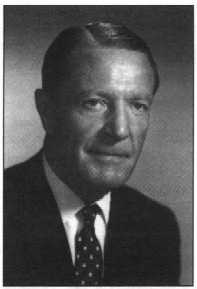 Return to George Champion page  Return to Hopkins Institute main page Read other tributes Paul Craig Roberts Gregory Fossedal Jeffrey Hart |
George Champion: A TributeBy John AhlgrenThe obituary of George Champion in the New York Times was woefully inadequate, dwelling as it did primarily on his banking career and chairmanship of the Chase Manhattan Bank. Yes, George Champion was a great banker, "the last banker from the financial integrity school," to quote Paul Craig Roberts. But to the thousands who came in contact with him, and especially to those of us fortunate enough to have known him well, his image towers far, far above talk of mere banking. Why? Because George Champion was the original Mister Integrity. He wrote the book on integrity and good character, and he inspired. everyone he dealt with to go and be likewise. George was also a leader and a pioneer, seeing problems as the first appeared on the horizon, long before the rest of the world recognized them. For example, over 30 years ago he foresaw that New York City would be facing financial and social bankruptcy in the 1970s. He took action. He organized and chaired the Economic Development Council of New York City. He was also the chairman and CEO of the New York Chamber of Commerce and Industry. He then merged the council and the chamber together for more efficiency. These organizations improved not just the business and financial health of the city, but also its schools, social and civic vitality. Then, when the bankruptcy crisis arrived, his efforts had paved the way for the solution of the crisis. Bill Ellinghaus, the chairman of the Municipal Assistance Corporation (the vehicle which pulled New York out of bankruptcy) said "It is right to say that without George Champion's pioneering efforts, the struggle to save New York would have been infinitely more difficult." Likewise in the field of higher education, George Champion foresaw the looming cancer of "political correctness" before it even had a name. He founded the Ernest Martins Hopkins Institute to rally Dartmouth alumni in opposing the glorification of "groupthink" above the rights of the individual, and to fight for the sacred right of each individual to have full access to all points of view. Champion also emphasized his view that scholarship is totally incomplete unless it is based on the foundation of good character in its students. He was mindful that world history is filled with men who may have been educated, cultured, charming and intelligent, but at the same time were weak, self- deceiving and allowed themselves to be shaped by circumstances and to feel at home both in dictatorship governments and in compromising business and social relationships. George Champion passed the torch of the best things in civilization to everyone within his reach. What better life could a man have? |